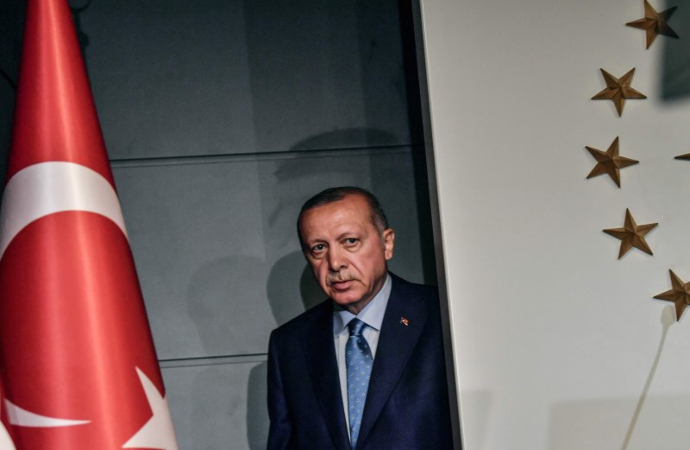How Erdogan is challenging Europe

In international life, two types of problems are often encountered: those that can be faced and those that cannot be addressed. Many are working hard right now to secure a ceasefire between Israel and Hamas. Nobody thinks of resolving anything: it is a conflict that is destined to last for who knows how many years or decades to come. But the problem is “manageable” in the sense that it will perhaps be possible to put a temporary patch on it. There are also problems of another nature, which are completely intractable. Nobody knows how to deal with them. Generally, we try to remove them, to pretend they don’t exist. In the hope that future history, in its constitutive unpredictability, will undo the knots. How long can the Western world pretend that Turkey – that is, a member of its main military Organization (NATO) – has not become an enemy? How can you be militarily allied with the enemy?
Let’s summarize, briefly, the facts. Turkey has been part of NATO since 1952. For decades she has therefore been an integral part of the Western alliance. A column. Consequently, she was also an ally of Israel. There was a close relationship between Turkey’s international position and its internal regime. Modern Turkey was shaped by Mustafa Kemal Atatürk who wanted it to be secular and “European”.
A legacy that the military, the real backbone of the Turkish regime (even in the phases in which parliamentary democracy was in force) defended and kept alive. Secularism in domestic politics, pro-Westernism in foreign policy. Then things changed: Islamic Turkey, the one reduced to silence or almost under Atatürk, took its revenge by defeating or corner European Turkey. The Islamic party led by Recep Tayyip Erdogan has, step by step, dismantled the legacy of Atatürk, knocked out the military (and gave them the decisive push after the failed 2016 coup), re-Islamized a great part of the company. With the re-Islamization, Turkish Westernism ended. It is debatable whether or not Europe has any responsibility: the barrage against Turkey’s request to join the European Union certainly contributed to weakening and humiliating European Turks to the benefit of Islamic Turkey. But perhaps re-Islamization has multiple and complex causes, it is not just the responsibility of Europe.
The first sign of the change in international location dates back to 2003 when, with the Islamic party already in power, Turkey, for the first time since the war, responded spades to a request from the United States, and refused to allow the US military to use the bases in Turkey to strike Saddam Hussein’s Iraq.
But perhaps the year in which the change in international location as a result of the change in internal regime and the ongoing re-Islamization of Turkish society became more evident was 2010: the Israeli attack on a Turkish ship that officially brought humanitarian aid to Palestinians (but, according to the Israelis, also weapons) signalled to the world that a revolution in alliances was underway. The agreement, which lasted decades, between Israel and Turkey ended. The progressive weakening of the Turkish alliance with Westerners was combined with a change in the Turkish front in the Middle East as well. The pro-Western adventure wanted by Atatürk was over, the neo-Ottoman one began.
Today Turkey plays on all possible tables. The fact that she is still a member of NATO allows her to keep Westerners at bay. In the meantime, he maintains close relations with Putin (with whom he is also a rival in the competition for the partition of Libya). Thanks to these relationships, it can also afford to challenge (until now successfully) that NATO of which it is also a part. As he demonstrated when he broke off Atlantic solidarity by buying missiles from Russia. Great sponsor, together with Qatar, of the Muslim Brotherhood, Erdogan plays against Saudi Arabia and Egypt aiming at the leadership of the Sunni world. This does not prevent him from finding points of contact and convergence with Shiite Iran. As in this moment (but not from today) in support of Hamas.
Anyone who thinks that in any case the Turkish action concerns only the Middle East and does not touch Europe is very mistaken. First of all because what happens there have consequences here. Turkish support for Islamic radicalism in the Middle East cannot fail to concern us. Furthermore, if the Mediterranean is permanently divided between Turks and Russians, it will be handed other than European ones that will have control over vital energy sources as well as the taps that regulate migratory flows.
But, in addition, Turkish action, and Erdogan’s ambitions, cross the borders of the Middle East. As demonstrated by the tensions between Turkey and Greece over the control of the gas resources in the eastern Mediterranean. This is also demonstrated by the massive intervention in the Balkan area where Turkey combines economic investments and religious indoctrination.
And that’s not all yet. Think of the harsh clash between the French president Emmanuel Macron and the dictator Erdogan. Turkey is trying again, this time with other means. Twice, the Ottoman Empire sought a way to invade Europe. Now Turkey wants to increase its political influence in the Old Continent by funding mosques that sponsor the most radical Islam. To condition European countries from within.
Sometimes, as has already been said, it is history, in its unpredictability, that unties the knots that humans do not know how to deal with. Maybe (who knows?) European Turkey, however hard hit and weakened by the Asian-Islamic one, will sooner or later raise its head. Despite Erdogan’s “cure”, Turkey remains a divided society, straddling Europe and Asia. If the two Turks clash again, this will certainly have consequences and repercussions on that country’s foreign policy as well. Perhaps it will reduce its ambitions, perhaps it will make it less aggressive both in the Middle East and towards Europe.




